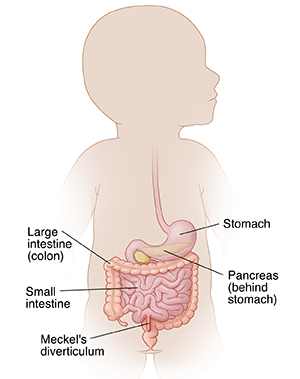When Your Child Has a Meckel’s Diverticulum
A Meckel’s diverticulum is a small pouch of tissue on the bowel (intestine). It forms when a baby is still growing in the uterus. This pouch may bleed. It may also become infected. Or the intestine can twist around it. When these occur, the Meckel’s diverticulum must be removed.
 |
| A Meckel’s diverticulum is an abnormal pouch of tissue on the small intestine. |
What are the symptoms of Meckel’s diverticulum?
Many children with this condition never have symptoms. When there is a problem, it’s often around age 2. The most common signs of a problem include:
-
Blood in stool
-
Low levels of red blood cells (anemia) due to blood loss that can cause low energy and pale skin
-
Signs of infection such as fever, chills, or belly pain
-
Signs of intestinal blockage such as nausea, vomiting, and pain
How is Meckel’s diverticulum diagnosed?
It’s common for the problem to not be found unless it causes symptoms. If your child has symptoms, they may have tests such as:
-
Blood tests. These check for signs of bleeding or infection.
-
Stool sample. This may be done to check for blood.
-
Meckel’s scan. A special dye is injected into the child’s bloodstream through an IV (intravenous) line. This dye may make the Meckel’s tissue show up on a scan.
-
Ultrasound. This test uses sound waves to make images. In some cases, the problem can be seen on an ultrasound image.
-
Arteriogram. This is a special X-ray test. Dye is injected into the arteries to see if bleeding can be seen. This may be done if bleeding is severe and the source can't be found.
-
Other tests. Imaging tests such as an X-ray or CT scan may be done to rule out other problems.
How is Meckel’s diverticulum treated?
If your child has no symptoms, treatment may not be needed. But if your child has symptoms, the pouch of tissue will likely be removed with surgery. This may be done by laparoscopic or open surgery. After surgery, the symptoms will usually go away. The pouch will not grow back.
© 2000-2025 The StayWell Company, LLC. All rights reserved. This information is not intended as a substitute for professional medical care. Always follow your healthcare professional's instructions.